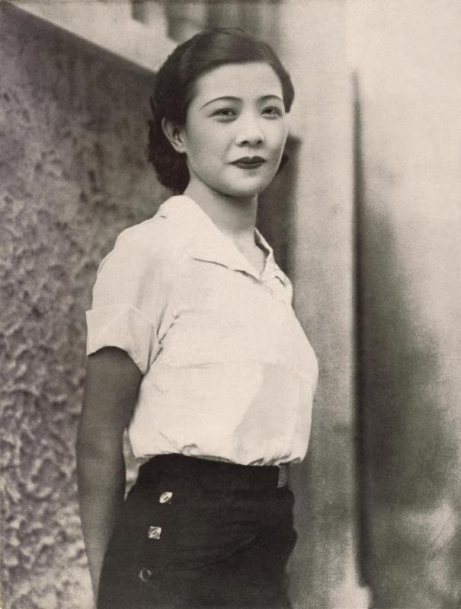 Ruan Lingyu was one of the first Chinese film megastars and remains one of the most important Chinese movie actresses.
Ruan Lingyu was one of the first Chinese film megastars and remains one of the most important Chinese movie actresses.
Born in 1910, she appeared in about 30 films between 1926 and her death (by suicide) in 1935. It is claimed that 100,000 people attended her funeral in Shanghai.
Many of these films (see below) are no longer extant (especially the earlier ones). All are in blank and white and silent.
There is an excellent biopic by Stanley Kwan, starring Maggie Cheung as Ruan (two icons for the price of one)!
Love and Duty [恋爱与义务] (1930)
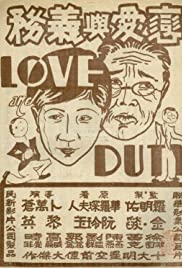 This is the earliest of Ruan’s surviving movies. Thought to be lost, a print was discovered in Uruguay in the 1990s and has been restored. Directed by Bu Wangcang (who directed several of Ruan’s movies), it is a story of love and tragedy.
This is the earliest of Ruan’s surviving movies. Thought to be lost, a print was discovered in Uruguay in the 1990s and has been restored. Directed by Bu Wangcang (who directed several of Ruan’s movies), it is a story of love and tragedy.
Student Li TsuYi [Korean-born actor Yin Jan, billed as Raymond King] lives beside Yang NeiFan [Ruan, as Lily Yuen]. They fall in love but NaiFan’s father insists on an arranged marriage with author Huang [Lay Ying].
Five years later they meet again when TsuYi saves one of NeiFan’s children (she now has two) from drowning in a local park. Huang himself is having an affair with Cheng Ying [Lily Chow]. Although she does not know about this, Nei Fan is soon involved with TsuYi and, despite being torn by leaving her children, she eventually runs away with him.
TsuYi struggles to support NeiFan and their young daughter and eventually falls ill and dies. NeiFan anticipates that both her husband and father would refuse support and contemplates suicide. But she decides to work on (as a seamstress) to support her daughter Ping Erh [Chen Yanyan].
Given that Ruan was 20 at the time, she looks very convincing as a 40ish NeiFan. She also plays her own oldest daughter with whom she is briefly reunited!
The film is a classic melodrama, very influenced by Hollywood and with limited Chinese input. The characters all wear western clothes and live in western-style houses. Huang live in Rue Lafayette (in the French concession) and meets his mistress at Samarkand Restaurant.
The film does use melodrama to raise important issues about personal freedom and the (in)dependence of women. As always, Ruan is striking but the film is overlong (at 2.5 hours) and not one of her best.
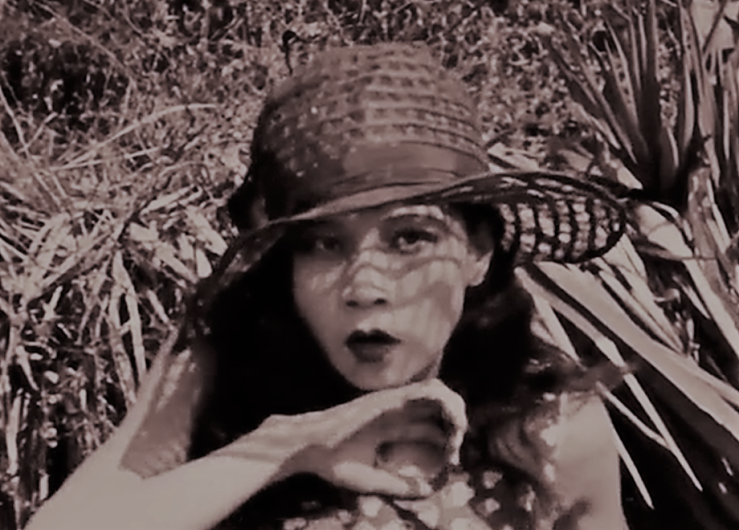
The film quality is unusually good, showing what might be done with other films of the period.
The film (and the others released in 1931) are an interesting early example of globalisation as they include English intertitles and the names of both characters and actors are somewhat anglicized.
The film was remade with sound (again with Bu directing and Yin staring) in 1938.
A Spray of Plum Blossoms [一剪梅] (1931)]
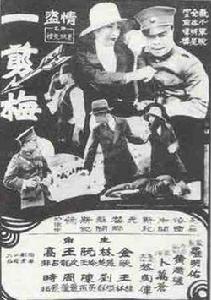
Plum Blossoms, directed again by Bu Wangcang, is a romantic comedy/drama based (loosely) on Shakespeare’s Two Gentlemen of Verona.
Valentine [Yan Jin] is a newly graduated cadet. Before heading off to his posting he unwisely introduces his classmate, the philandering Proteus [Wang Tse-lung], to his sister Julia (Ruan]. Proteus (the English-language names are taken from the play) immediately falls for the beautiful and vivacious Julia.
Meanwhile, Valentine has been posted to Canton where he is appointed as captain of the guards to the Governor, General Sze. And he falls in love with the General’s daughter, Silvia [Lam Chocho].
When Proteus is also ordered to Canton he exchanges rings with Julia as a sign of love. But when he gets there, the fickle flirt falls for Silvia. To remove a rival, Proteus informs the General that Valentine and Silvia plan to elope. Valentine is banished and becomes a Robin Hood-like bandit. Meanwhile, learning of his fate, Julia travels to Canton and learns of Proteus’ faithlessness. The women join forces, with Julia disguised as one of Silvia’s uniformed guards.
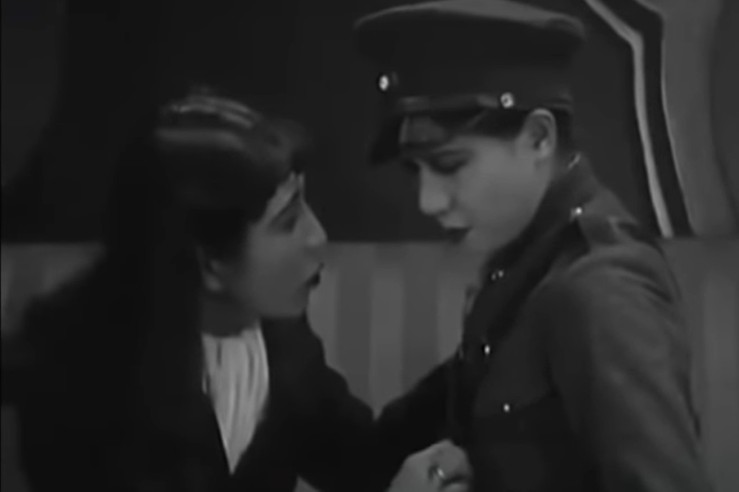
After many adventures, Silvia and Valentine are reunited and so, suspending all credibility, are Julia and Proteus.
The films sticks fairly closely to the original story-line but this is not one of Shakespeare’s greatest plays. And the film could have cut several scenes to keep the plot moving.
Ruan, only 20 and already a huge star, is excellent as the spirited Julia, though even she has difficulty in making her love for the idiotic Proteus look credible. But this is really an ensemble piece and the plum flowers of the title are Silvia’s motif. Julia’s cross-dressing, which comes from the original play, does reinforce the Ruan/Garbo comparisons.
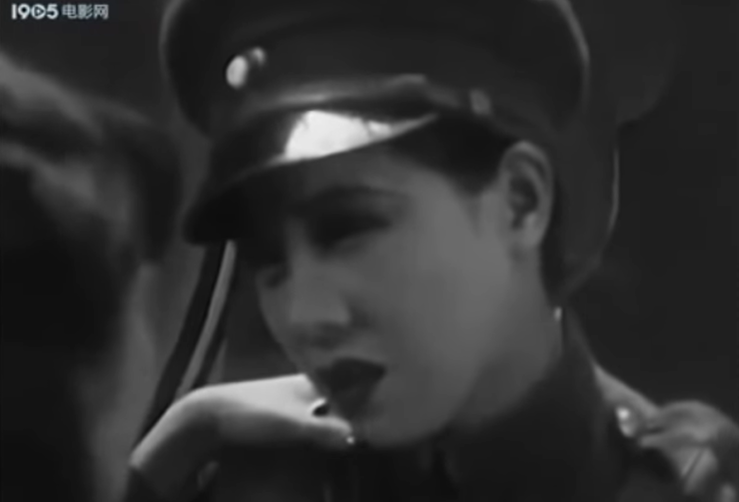
The film, perhaps reflecting its source, is highly westernised. Like Love and Duty, the main characters all wear western clothes and sport western hairstyles.
The Peach Girl [桃花泣血記] (1931)
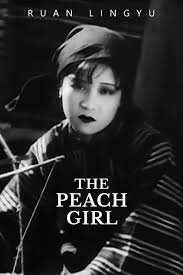 The Peach Girl, again directed by Bu Wangcang, tells the story of love between a poor girl and a rich boy. The rather anodyne English title fades compared to the Chinese version: Peach Blossom Weeps Tears of Blood.
The Peach Girl, again directed by Bu Wangcang, tells the story of love between a poor girl and a rich boy. The rather anodyne English title fades compared to the Chinese version: Peach Blossom Weeps Tears of Blood.
The movie starts as little Lim is born. Her father (Loo Chi [Wang Guilin]) is a farm steward whose responsibilities include the care of a large peach orchard. Her parents plant a peach tree as a symbol of her future life and we are told that, in China, the peach tree ‘speaks of love, of sorrow, and of tears’.
The landowner, Mrs. King [Li Shiyuan ], has a child of the same age and as they grow older, Lim (now Ruan, billed here as Lily Yuen) and Teh-en (Yin Jan again) fall in love.
But the wealthy Mrs. King refuses to allow her son to marry somebody from a lower social class. Teh-en lies to Lim, telling her his mother approves their marriage, and sets up home with her.
Inevitably, the deceit is uncovered. Lim, now pregnant, realises too late that Teh-en has deceived her and Mrs. King sacks Loo Chi as revenge for his daughter’s involvement with her son. Her father tells Lim to dig up the symbolic peach tree.
Loo Chi later loses his sight in a fight with cattle thieves and, when Lim’s baby is born, she is in extreme financial difficulties. Her landlady helpfully puts her in touch with a pimp (a common trope in 1930 Chinese movies and literature). Exactly what happens next is skipped over but, as the intertitles tell us, sickness inevitably comes to the poor and Lim falls ill.
When he hears this, Teh-en comes running in time to say goodbye and a remorseful Mrs. King accepts Loo Chi and Lim’s daughter into her family.
The film is an engaging melodrama but involves much less social commentary than later films. While it does acknowledge social class divides, even the rich turn out to be not so bad in the end. The quintessentially urban Ruan is less convincing as a naive farm girl.
Little Toys [小玩意] (1933)
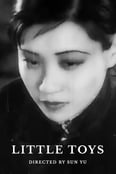 An interesting film by director Sun Yu with the bonus of starring both Ruan and Li Lili.
An interesting film by director Sun Yu with the bonus of starring both Ruan and Li Lili.
Ye Xiuxiu [Ruan] is a toymaker living in rural China about 1920. She is married with a daughter Zhuer and, later, a son. She is proud of the toys she makes by hand but wants to improve the quality of Chinese toys to combat the invasion of foreign toys.
A visiting student Yang [Yuan Congmei] falls for her but she rejects his advances, advising him to go abroad and study toy making which he reluctantly agrees to do.
Her husband later dies and, in the confusion, her son is abducted and sold for adoption in Shanghai.
Following disputes between local warlords, the village is burnt down and the villagers move to Shanghai. Ten years later (1931), 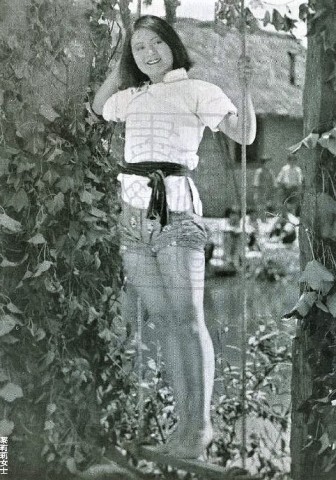 Zhuer [Li Lili] is helping Xiuxiu in her business, when not instructing the neighbours on fitness exercises or meeting her boyfriend. As usual in Sun’s films, Li Lili’s legs feature prominently.
Zhuer [Li Lili] is helping Xiuxiu in her business, when not instructing the neighbours on fitness exercises or meeting her boyfriend. As usual in Sun’s films, Li Lili’s legs feature prominently.
Yang has returned and established a large toy company. But, despite his best efforts, he is unable to find Xiuxiu.
However, when the Japanese invade in the 1932 Shanghai Incident (or 28 January Incident), Zhuer is killed.
After the ceasefire, things return to normal but Xiuxiu has to sell her toys in the street to make ends meet. In the type of coincidence beloved of Chinese films of the time, one of her customers is her missing son who, it tuns out, is a loyal Chinese boy.
Startled by fireworks, Xiuxiu thinks the Japanese are returning and almost starts a panic. Yang is amongst the crowd. He recognises Xiuxiu and comes to her aid. Pointing to members of the surrounding the crowd and then direct to camera, Xiuxiu urges collective resistance to the Japanese (although her words are not actually included in intertitles).
The film is an uneven combination of serious issues about nationalism and a love story. While Sun is usually seen as a leftist writer, this film is much more nationalist (understandably so in the context of the time). The advocacy of Chinese toy manufacturing (often soldiers and guns) is clearly intended as an allegory for national strength in the face of a threatening Japanese Empire. As one character says, if you bow down before a tiger, you become its prey: instead we should take arms and kill the tiger.
But Xiuxiu’s commitment to economic sovereignty sounds somewhat strange in the context of the film. This is exemplified in a scene where Yang makes love to Xiuxiu and asks her to run away with him. The subtitles say that she tells him to go away and study the manufacture of toys. Her face and gestures say something completely different.
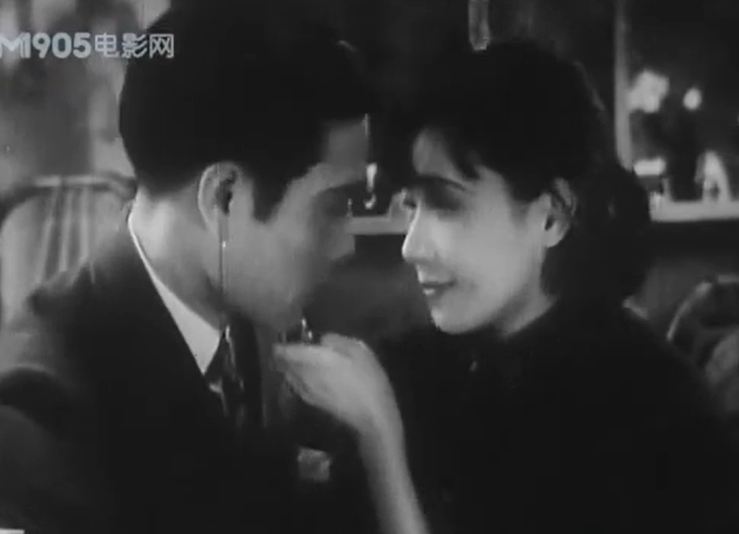
This uneven combination is a feature of Sun Yu’s films at that time. In Daybreak, we have a film which condemns the vice of Shanghai while showing Li Lili at her most attractive as a sex worker. In Sports Queen, Sun makes serious points about the role of sport in society while showing off as much of Li’s legs as the censor will allow. It’s not that one can’t make films about serious issues with attractive actresses but that Sun does not combine the two very smoothly.
The Goddess [神女] (1934)
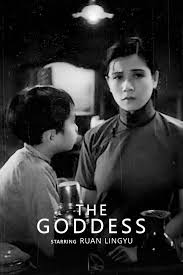 While Ruan Lingyu shines in all her extant films, it would be a stretch to describe most of them as essential viewing for anyone other than those interested in the history of Chinese film. This reservation does not apply to The Goddess which is a classic of silent cinema.
While Ruan Lingyu shines in all her extant films, it would be a stretch to describe most of them as essential viewing for anyone other than those interested in the history of Chinese film. This reservation does not apply to The Goddess which is a classic of silent cinema.
Ruan is an (unnamed) sex worker in 1930s Shanghai. She is in the clutches of the Boss [Zhang Zhizhi], a small time criminal with a gambling addiction who ‘treats her as his property’ and steals her earnings. Despite her efforts to escape, she can’t get away from him.
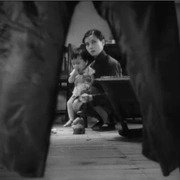
She uses her earnings to raise her young son and later to send him to school. But when her neighbours object to her occupation, the school board, over the objections of the principal, expel the child.
Of course, the film ends tragically as she kills the Boss and is sent to prison. But, in some consolation, the principal offers to raise her son so that the cycle of poverty may be broken.
The film is brilliantly presented by writer and director Wu Yonggan (in his debut film): every shot moves the action and characterisation forward. The director never condemns her involvement in sex work but does not hide it either.
In contrast to some other Chinese films of the time, there is nothing glamorous about this trade. When the director films her meeting men it is from an oblique angel (shots of male and female feet meeting and walking away or a birds-eye shot).
The shots of her trial and imprisonment are almost expressionist in their stylisation.
In contrast to the sympathetic treatment of the central character, the film is highly critical of how society (represented by neighbours, the school board and the criminal justice system) treats women generally and sex workers in particular.
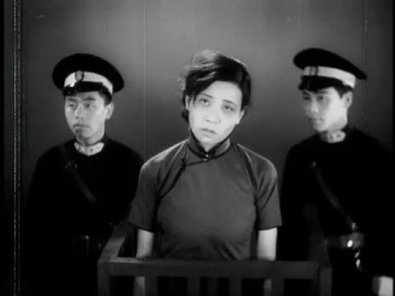
Ruan is powerful in the central role. The film is not, of course, a contemporary feminist film: she still has to pay for ‘her sins’ and any hope for the future comes from a male authority figure.
But the film remains a powerful condemnation of the oppression of women.
New Women [新女性] (1935)
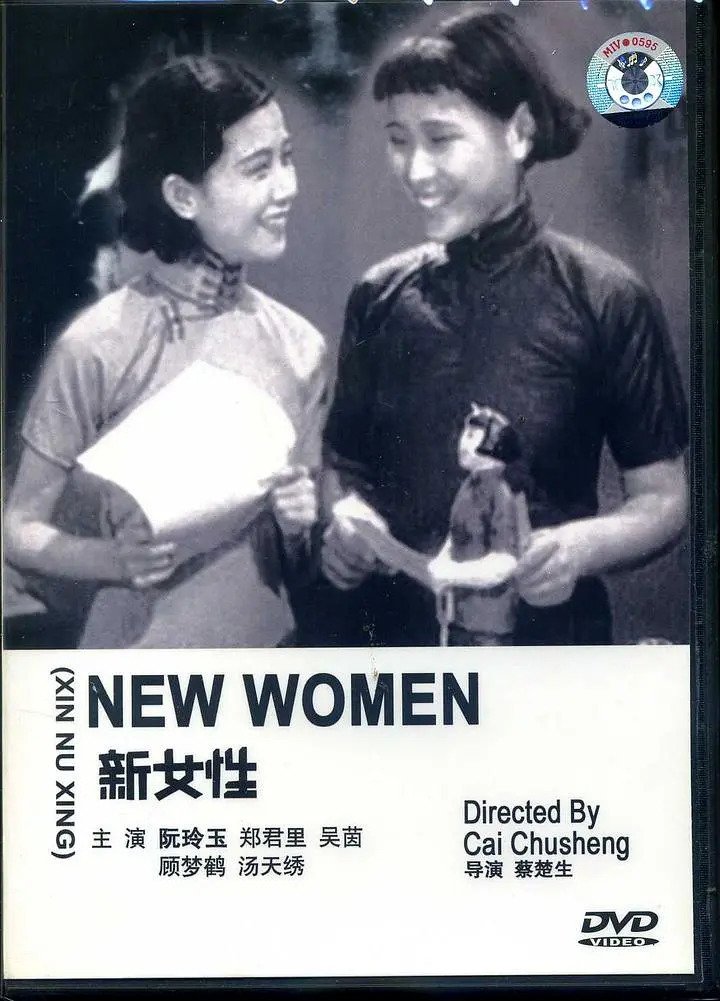
Wei Ming [Ruan] is again a single mother with a young child, this time a daughter Xiao Hong. However, she is a music teacher and writer whose novel has just been accepted for publication (albeit that the publisher will not give her any advance on sales).
She likes her publisher’s agent Yu Haichou [Zheng Junli] but he is well-meaning but ineffectual. All the other men she comes in contact with are awful. Her child’s father ran away with her but then deserted her leaving her to bring up the child on her own.
Her publisher is mainly interested in her because of her looks as is a newspaperman who publishes her stories. Her schoolfriend’s husband Wang [Wang Naidong], now on the bard of her school, also lusts after her and when she refuses his advances, arranges that she loses her job to put more pressure of her.
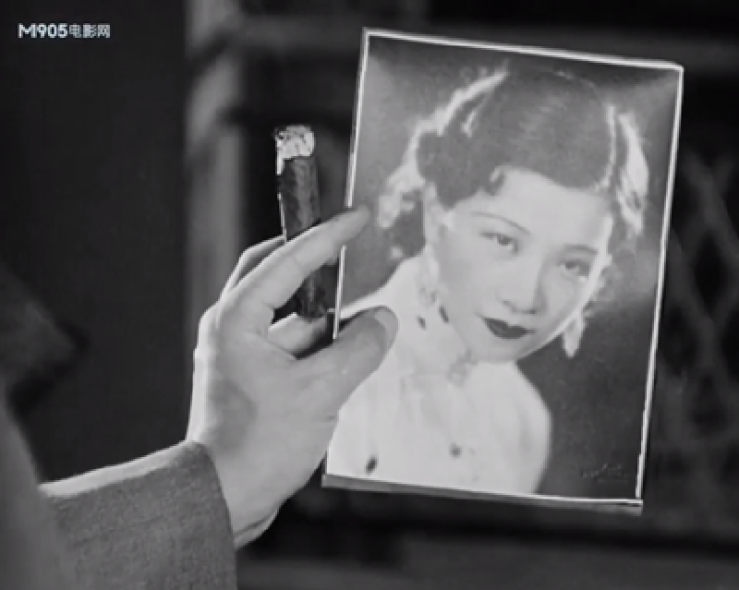
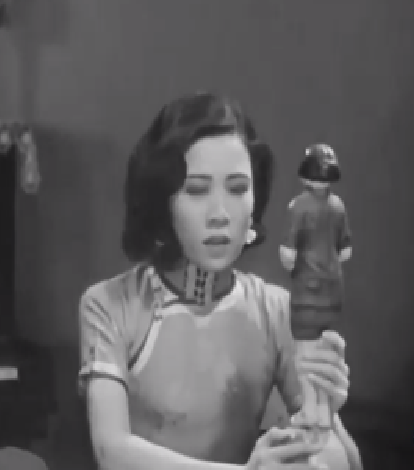 At the same time. Wei Ming is a modern woman. Her apartment is decorated with movie-star like pictures of herself (of which she provides copies to her publisher) and, when the boring Yu turns her down, she goes nightclubbing with Wang. But when the sleazy Wang tries to bring her to a hotel, she quickly dumps him. Her resilience is exemplified by the ‘cant be knocked down’ doll she buys for her daughter.
At the same time. Wei Ming is a modern woman. Her apartment is decorated with movie-star like pictures of herself (of which she provides copies to her publisher) and, when the boring Yu turns her down, she goes nightclubbing with Wang. But when the sleazy Wang tries to bring her to a hotel, she quickly dumps him. Her resilience is exemplified by the ‘cant be knocked down’ doll she buys for her daughter.
Meanwhile, her sister who has been bringing up Xiao Hong comes to live with Wei Ming as her own husband has died. Of course, Xiao Hong soon falls ill and the film, as Chinese films do today, shows the health care system as inaccessible and unaffordable.
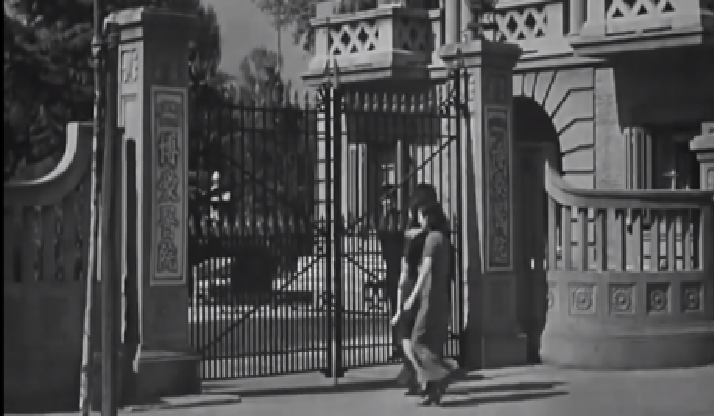
Wei Ming considers prostitution to save her child’s life (as always in 1930s Chinese movies a ‘kindly’ (read self-serving) procuresss is not far off) but ultimately refuses to do so. When Xiao Hong dies, Wei overdoses on sleeping tablets though, in a memorable scene, she later decides that she wants to live (unfortunately too late).
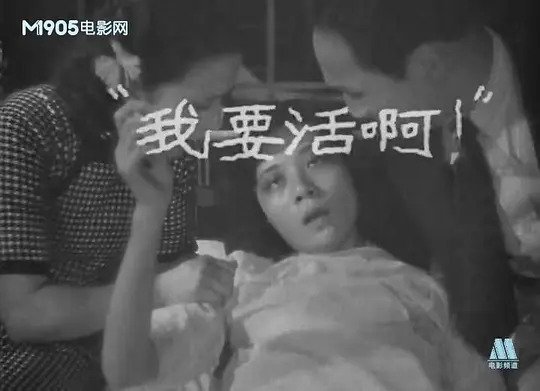
The film is much more complex in storyline that The Goddess but the message is the same. Women have a very hard time surviving in a patriarchal society. Wei Ming sees herself in the place of a female prisoner (one of the acts at a nightclub she attends).
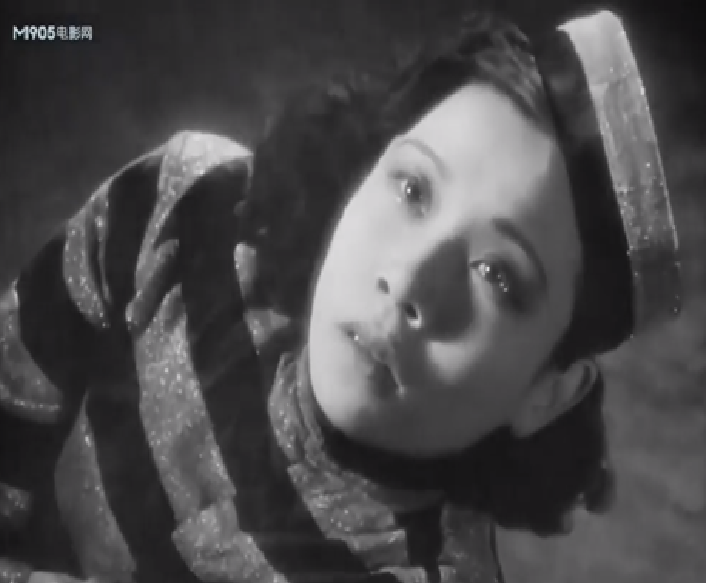
Wei Ming’s life is contrasted with that of her neighbor Li Aying [Yin Xu], the real ’new woman’ who teaches working woman in night classes. The Peach Blossom River played in a nightclub Wei attends is contrasted with the Hunagpu River song by these working women. But Aying is never developed as a real character and frankly the didactic/propagandist sections of the film are the weakest. Ruan is, of course, the centre around which the films rotates.
The film draws on the then recent suicide of actress Ai Xia (Spring Silkworms) and highlights the role of the press in sensationalizing and distorting women’s lives in a way it would never do to men. It is, of course, horribly prescient about what was to occur in the life of Ruan herself only months later.
The film, directed by Cai Chusheng, is silent but with some added sound effects.
National Customs [國風] (1935)
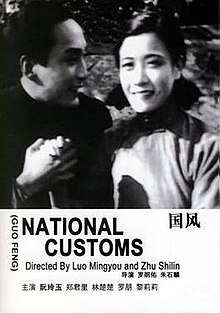 Released only after her death, National Customs is the last film from the great Ruan Lingyu. It was written by Luo Mingyou, co-directed by Luo and Zhu Shilin
Released only after her death, National Customs is the last film from the great Ruan Lingyu. It was written by Luo Mingyou, co-directed by Luo and Zhu Shilin
Zhang Lan [Ruan] and Tao [Li Lili] are two secondary students who have just graduated. Both are in love with their cousin Chen Zuo [Zheng Junli] but he proposes to Lan. She wants to accept but turns him down because her flighty sister loves him. Lan goes off to be a school teacher and they marry.
But the school directors decide to send the top graduate, Lan, to Shanghai for a higher education scholarship. Hearing this, Tao, tiring of marriage, decides that she also wants to study. Lan is studious but Tao bobs her hair and, like many of the female students, spends more time on make up and dancing.
Lan remonstrates with her that they are country girls contrasting the frugality of the country with the excessive modernity and extravagance of the city. Lan also asks Xu Boyang, [Luo Peng] Tao’s dancing partner, to desist from this ‘meaningless socializing’.
Of course, Tao won’t listen and plans to marry Xu. Now that she is educated, her expectations are higher. Having qualified, Tao and Xu return as teachers to their home town impressing the students with their foreign ways.
Of course, things end badly for Tao and Xu who are dismissed for their irresponsible approach, despite the objections of the members of the corrupt school board led by Xu’s father. Tao and Xu realise the errors of their ways and are ‘born again’ while the local people get lots of lectures about the dangers of ‘depravity and filth’. Lan returns but decides to dedicate her life to education (at least for several years) rather than marry cousin Zuo now divorced from Tao.
The film forms part of the Nationalist government’s New Life Movement to promote cultural reform and Neo-Confucian social morality. Frankly, even with the presence of Ruan and Li, its quite a boring film. Ruan, perhaps in an effort to change her image after Goddess and New Woman, gets the boring ‘good girl’ role whereas Li at least gets to play to type as the bad girl.
Of course one might wonder from an audience perspective, whether Neo-Confucian social morality stood much chance against Li Lili in full flight!
Filmography
| Year | English title | Original title | Role | Status |
|---|---|---|---|---|
| 1927 | A Married Couple in Name Only | 掛名的夫妻 | Shi Miaowen | Lost |
| The Tablet of Blood and Tears | 血淚碑 | Liang Sibao | Lost | |
| Yang Kwei Fee of Peking | 北京楊貴妃 | Yang Xiaoyue | Lost | |
| The Heart of Women | 婦人心 | Lost | ||
| 1928 | The Luoyang Bridge | 蔡狀元建造洛陽橋 | Wang Yongxu | Lost |
| The White Cloud Pagoda | 白雲塔 | Pu Lüji | Lost | |
| 1929 | The Pearl Crown | 珍珠冠 | Lost | |
| Warnings for the Lovers | 情欲寶鑑 | Lost | ||
| Lonely Swan After the Calamity | 劫後孤鴻 | Lost | ||
| Attacking Nine-Dragon Mountain | 大破九龍山 | Lost | ||
| Burning Nine-Dragon Mountain | 火燒九龍山 | Lost | ||
| The Flower of the Silver Screen | 銀幕之花 | Lost | ||
| 1930 | Dream of the Ancient Capital | 故都春夢 | Lost | |
| Suicide Contract | 自殺合同 | Lost | ||
| Wild Flowers by the Road | 野草閒花 | Lilian | Lost? | |
| 1931 | Love and Duty | 戀愛與義務 |
Yang Naifan & Huang Guanying |
Available |
| A Spray of Plum Blossoms | 一剪梅 | Hu Zhilu/Julia | Available | |
| The Peach Girl | 桃花泣血記 | Miss Lim | Available | |
| Yu Tang Chun | 玉堂春 | Lost | ||
| 1932 | Another Dream of the Ancient Capital | 續故都春夢 | Lost | |
| 1933 | Three Modern Women | 三个摩登女性 | Zhou Shuzhen | Lost |
| Night in the City | 城市之夜 | Daughter | Lost | |
| Little Toys | 小玩意 | Sister Ye | Available | |
| 1934 | Life | 人生 | Lost | |
| Coming Home | 歸來 | Wan”er | Surviving reels are unedited | |
| Goodbye, Shanghai | 再會吧,上海 | Partially survived, missing 3 reels | ||
| A Sea of Fragrant Snow | 香雪海 | Lost | ||
| The Goddess | 神女 | Prostitute | Available | |
| 1935 | New Women | 新女性 | Wei Ming | Available |
| National Customs | 國風 | Zhang Lan | Available |



[…] A Spray of Plum Blossoms […]
LikeLike
[…] Yonggang (born 1907) is famous as the director of his first film The Goddess, starring Ruan Lingyu. This is justly regarded as one of the best ever Chinese movies and indeed a […]
LikeLike